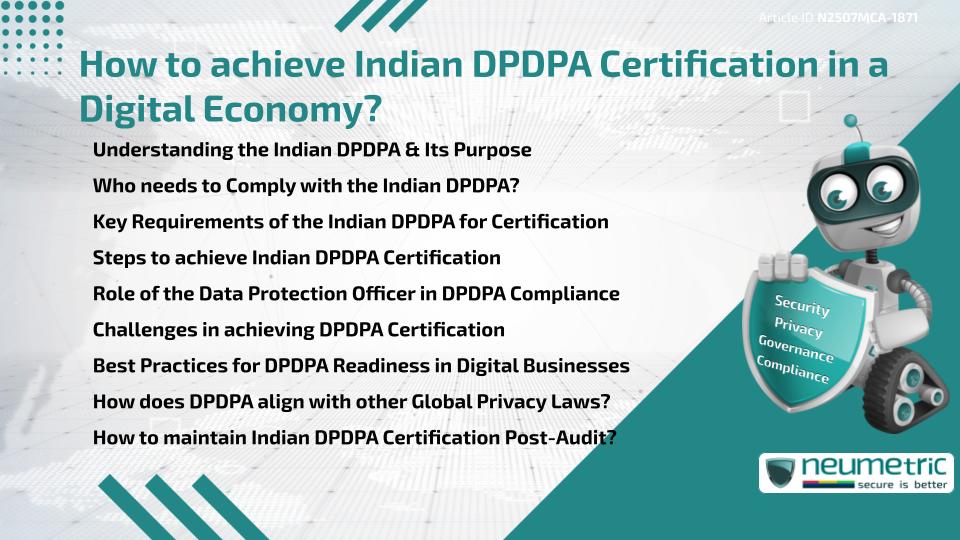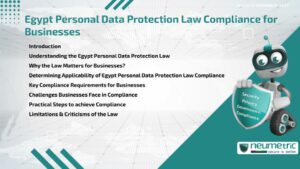Table of Contents
ToggleIntroduction
In an increasingly data-driven world, Privacy is no longer optional-it is foundational. The Digital Personal Data Protection Act [DPDPA] of India marks a significant step toward ensuring that businesses handle Personal Data responsibly. For Organisations operating digitally, understanding How to achieve Indian DPDPA certification is critical to building trust, avoiding penalties & maintaining data integrity. This guide explains the Certification Process in simple terms, highlighting key requirements, roles & strategic actions needed for Compliance.
Understanding the Indian DPDPA & Its Purpose
The Indian Data Protection & Privacy Act [DPDPA] was enacted to regulate the processing of Personal Data by Organisations while upholding the Privacy rights of individuals. Inspired by global frameworks like EU GDPR, the law applies to entities that collect, store or process data within India or target Indian citizens. The main purpose is to provide individuals with greater control over their Personal Data, promote responsible data processing & hold businesses accountable.
Who needs to Comply with the Indian DPDPA?
Any Organisation that processes Personal Data of Indian citizens must comply with the DPDPA. This includes:
- Startups & MSMEs operating online platforms.
- SaaS companies offering services to Indian users.
- Multinational corporations processing data within India.
- Educational platforms collecting student data.
- Health & Finance Organisations handling sensitive Personal Information.
Even if a company is based outside India, it must comply if it targets Indian users. This territorial scope mirrors global data laws & reinforces the need to understand How to achieve Indian DPDPA certification.
Key Requirements of the Indian DPDPA for Certification
Before pursuing certification, businesses must ensure Compliance with key provisions of the law. These include:
- Lawful basis for data processing (such as consent or legal obligation).
- User rights enablement like access, correction & erasure.
- Data minimisation & storage limitation.
- Appointment of a Data Protection Officer [DPO] for large-scale data processing.
- Security safeguards to prevent unauthorised access or misuse.
- Incident reporting protocols in case of data breaches.
These requirements form the foundation for understanding How to achieve Indian DPDPA certification.
Steps to achieve Indian DPDPA Certification
To begin the certification journey, Organisations can follow a structured path:
- Conduct a Data Protection Impact Assessment [DPIA]
Identify what Personal Data is collected, how it is used & where it is stored or transferred. - Appoint a Data Protection Officer [DPO]
Designate someone to oversee Compliance & serve as the liaison with regulators. - Implement Technical & Organisational Measures
Apply encryption, Access Controls & internal Policies that ensure safe handling of Personal Data. - Obtain Valid Consent & manage Data Requests
Put systems in place for users to give, withdraw or manage consent easily. - Document Processing Activities
Maintain records of data flows, processing purposes & security protocols. - Undergo a Compliance Audit
Work with an approved certifying body to evaluate your Organisation’s adherence to the law. - Apply for Certification
Submit evidence & results of the Audit to the relevant authorities for review & approval.
This structured approach supports your strategy on How to achieve Indian DPDPA certification effectively.
Role of the Data Protection Officer in DPDPA Compliance
The DPO is central to any certification strategy. Responsibilities include:
- Monitoring Compliance with the DPDPA.
- Providing internal training & awareness.
- Acting as a point of contact for the Data Protection Board of India.
- Managing data breach responses & reporting.
Organisations unsure of How to achieve Indian DPDPA certification must prioritise hiring or training a capable DPO.
Challenges in achieving DPDPA Certification
While the process is clear, businesses often encounter roadblocks such as:
- Lack of skilled personnel for Privacy Compliance.
- Legacy systems that do not support secure data handling.
- Misinterpretation of consent or breach requirements.
- Cost of Continuous Monitoring & Audits.
Understanding these hurdles is vital when planning How to achieve Indian DPDPA certification in a scalable & sustainable manner.
Best Practices for DPDPA Readiness in Digital Businesses
To streamline Compliance efforts:
- Start early with Risk Assessments.
- Conduct Employee Training to build awareness.
- Adopt Privacy–by-design in software development.
- Use automated Compliance tools to manage documentation & Audits.
- Partner with certified legal advisors or auditors familiar with Indian law
Such actions not only simplify How to achieve Indian DPDPA certification but also build a Privacy-conscious business culture.
How does DPDPA align with other Global Privacy Laws?
The Indian DPDPA shares similarities with:
- EU GDPR in terms of data subject rights & consent.
- California CCPA for consumer control mechanisms.
- Singapore PDPA regarding cross-border data flow obligations.
If your Organisation is already GDPR-compliant, you are halfway through understanding How to achieve Indian DPDPA certification.
How to maintain Indian DPDPA Certification Post-Audit?
Certification is not a one-time event. To maintain Compliance:
- Conduct annual internal reviews.
- Refresh Privacy Policies periodically.
- Respond swiftly to User data access or erasure requests.
- Re-assess Vendors & third parties handling User data.
Regular updates & vigilance are essential in maintaining the benefits of How to achieve Indian DPDPA certification in the long term.
Takeaways
- The DPDPA enforces strict rules for responsible data handling in India.
- Understanding How to achieve Indian DPDPA certification is key for digital businesses.
- A structured approach involving assessments, Audits & technical controls ensures Compliance.
- The role of the DPO is crucial in navigating the certification journey.
- Ongoing monitoring & User engagement help maintain certification beyond the initial Audit.
FAQ
What is the first step in How to achieve Indian DPDPA certification?
The first step is to conduct a Data Protection Impact Assessment [DPIA] to understand your data landscape & associated Risks.
Do Small Businesses need to comply with the DPDPA?
Yes, if they collect or process Personal Data of Indian citizens, they are obligated to comply with the DPDPA & pursue certification.
Who issues the Indian DPDPA certification?
The certification is issued by a Government-recognised body after a formal Audit of Data Protection practices & Compliance measures.
How long does it take to achieve Indian DPDPA certification?
Depending on your data maturity level, it can take anywhere from three (3) months to one (1) year to complete the Certification Process.
Is Indian DPDPA certification mandatory?
While not always mandatory, it is often required by enterprise Clients & enhances your credibility as a data-responsible company.
How does DPDPA certification benefit my business?
It builds Customer Trust, prevents regulatory fines & opens up opportunities for working with data-sensitive sectors.
Can foreign companies get DPDPA certified?
Yes, any Organisation processing Personal Data of Indian citizens must comply, regardless of their location.
Do I need a DPO to get DPDPA certified?
Yes, for large-scale processing or Sensitive Data handling, appointing a DPO is necessary to ensure legal Compliance.
Need help?
Neumetric provides organisations the necessary help to achieve their Cybersecurity, Compliance, Governance, Privacy, Certifications & Pentesting goals.
Organisations & Businesses, specifically those which provide SaaS & AI Solutions, usually need a Cybersecurity Partner for meeting & maintaining the ongoing Security & Privacy needs & requirements of their Clients & Customers.
SOC 2, ISO 27001, ISO 42001, NIST, HIPAA, HECVAT, EU GDPR are some of the Frameworks that are served by Fusion-a centralised, automated, AI-enabled SaaS Solution created & managed by Neumetric.
Reach out to us!





